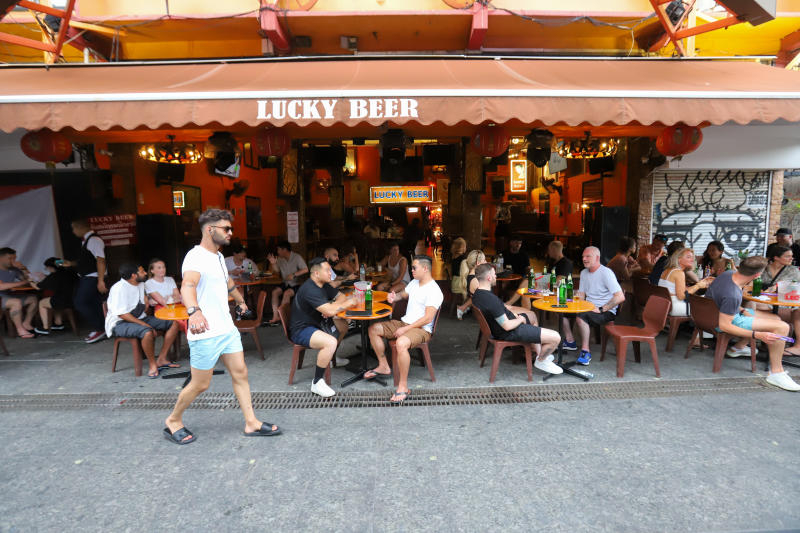A worker enjoys an afternoon drink near the parliament complex in Dusit district, Bangkok. (Photo: Pornprom Satrabhaya)
People in Thailand wanting to quench their thirst with an afternoon tipple risk steep fines from Saturday under amended alcohol control legislation that strengthens enforcement and significantly tightens restrictions around marketing and advertising.
Alcohol sales in Thailand have been banned at most retail outlets and supermarkets between the hours of 2pm and 5pm since 1972, but changes to the Alcoholic Beverage Control Act that take effect on Saturday now mean individuals can be fined 10,000 baht (US$300) or more for drinking or being served alcoholic beverages during prohibited times or in prohibited places.
Although there are exemptions for licensed entertai…
A worker enjoys an afternoon drink near the parliament complex in Dusit district, Bangkok. (Photo: Pornprom Satrabhaya)
People in Thailand wanting to quench their thirst with an afternoon tipple risk steep fines from Saturday under amended alcohol control legislation that strengthens enforcement and significantly tightens restrictions around marketing and advertising.
Alcohol sales in Thailand have been banned at most retail outlets and supermarkets between the hours of 2pm and 5pm since 1972, but changes to the Alcoholic Beverage Control Act that take effect on Saturday now mean individuals can be fined 10,000 baht (US$300) or more for drinking or being served alcoholic beverages during prohibited times or in prohibited places.
Although there are exemptions for licensed entertainment venues, hotels, certified establishments in tourist areas and airports offering international flights, the onus has been shifted to consumers, and the tightened laws also prohibit advertising of alcoholic beverages unless the content is purely factual. The use of celebrities, influencers or public figures to promote alcoholic beverages for commercial purposes is also banned.
The new regulations will have an adverse effect on restaurants because it is the customer that is now “restricted” by the stipulated sale hours, Chanon Koetcharoen, president of the Thai Restaurant Association, said.
If an establishment sells a bottle of beer to a customer at 1.59pm, for example, but they sit and drink on the premises until 2.05pm, that will constitute a violation of the law under Section 32, and that person could be fined. “This will impede the growth of the restaurant industry,” Mr Chanon, who also runs a restaurant in Bangkok, said.
Along Khao San Road, an area in Bangkok known as a backpacker hub, one business said they are operating as a hybrid bar and restaurant from 11am to 2 am. Alcohol sales are loosely controlled considering customers can and do order drinks between the officially prohibited hours.

A scene of people socialising with drinks at a pub on Khaosan Road in Bangkok. (Photo: Pattarapong Chatpattarasill)
With the possibility of drinkers themselves being fined, sales of alcohol may halve during those times, Bob, an assistant manager working on Friday said, declining to give his full name because he is not authorised to speak publicly.
There is also concern the stricter laws present an opportunity for officials to enforce fines on customers, restaurants — or both — for personal gain.
Taopiphop Limjittrakorn, a member of parliament from the opposition People’s Party who has pushed for liquor liberalisation, said alcohol sales should be around the clock. “The amended law aims to serve the purpose of those opposing alcohol,” Mr Taopiphop said.
They also risk confusing foreign tourists who may order a drink before the restricted hours but consume it afterward, he said.
In Thailand, where Buddhism is the main religion, practitioners and monks follow the Five Precepts, which include abstaining from alcohol and intoxicants to promote mindfulness and avoid heedlessness.